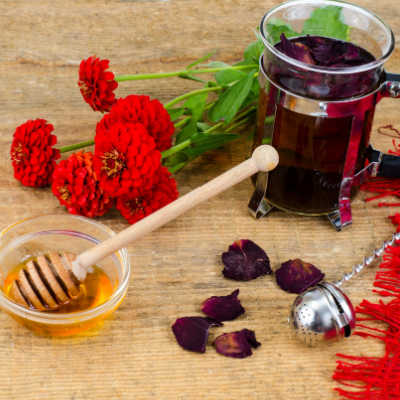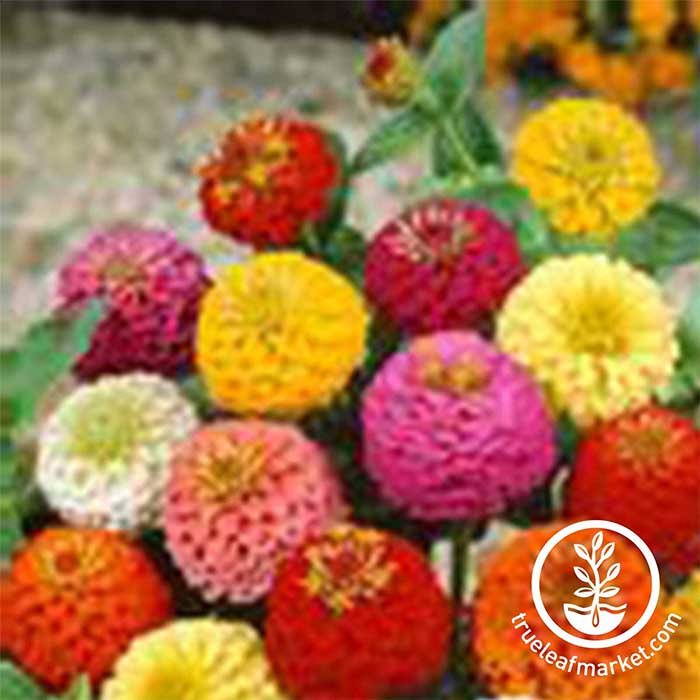
Ashleigh Smith

Zinnias are one of the most popular flowers out there for many reasons. They are incredibly colorful, coming in shades of red, pink, orange, yellow, green, purple, and white. Because they are developed from three different types of zinnia, you can find them in various heights suitable for anything from hanging baskets to hiding a fence line. Whether you want something small and dainty or large and full, there is a zinnia for you. You can expect zinnias to bloom throughout the summer and up to the first fall frost. We recommend growing your zinnias from seed as they are one of the easiest flower types to grow and do well in hot and drought-prone regions. Learn how you can get started below!
Special Collection Zinnias
Lilliput Mix - A shorter semi-dwarf variety that also works well in hanging baskets. Try growing in mass for a flowing blanket of color throughout the summer.
California Giant Mix - This large bloom is quite impressive with its flowering heads that span 5-6 inches in diameter. These zinnias can also rise up to 4 feet tall, making them a great option for camouflaging fence lines and adding a splash of color against your home.
Zinnia Growing Information
- Native: Mexico and the Southwestern U.S.
- Family: Asteraceae
- Life Cycle: Annual
- Hardiness Zone: 2-11
- Days to Maturity: 60-80 Days
- Days to Germination: 5-7
- Seeding Depth: 0.25 inches
- Plant Spacing: 8-24 inches
- Germination Temperature: 70-75 F
- Temperature Preference: 55-65 F
- Direct Sow: Yes
- Start Indoors: 4-6 weeks
- Light Preference: Full Sun

- Soil Preference: Rich, fertile, well-draining, pH 6-8.
- Watering: Zinnias have normal watering requirements and do not like to have wet feet. To help prevent issues with pests and diseases, water near the soil surface. If your soil tends to stay wet, amend it with sand, perlite, or a mix of materials to improve its drainage ability.
- Attracts: Pollinators such as bees, butterflies, and hummingbirds.
- Disease: Susceptible to powdery mildew, leaf spots, root rots, and blights.
- Pests: Japanese beetles, aphids, and mites. Fungal blooms are more likely in shaded or moist conditions.
To grow zinnias from seed, plant 0.25 inches deep in an area that has been cleared of any weeds. Make sure your growing location gets full sun (8+ hours) and can be watered regularly. Plant seeds approximately 8-12 inches apart for most varieties. Larger varieties like the California Giant or State Fair Mix can be planted up to 24 inches apart as they can get quite large. Around 60-80 days (depending on variety), you can start enjoying your lovely Zinnia blooms. Harvesting flower heads from time to time or deadheading spent blooms can help encourage more flowers to develop throughout the growing season. Zinnias are not hardy and may be removed after your first fall frost. If left to flower and produce seeds, you may see new sprouts the following spring.
Zinnias are Edible
In addition to being pretty to look at, Zinnias are also edible. Their flavor can be bitter, so it is best to pair them with other ingredients or stick to using them as a garnish. It is recommended to separate the petals from the seeds. This summer is the perfect time to start using more flowers in your everyday cooking or to impress your friends and family. Get started by including zinnia petals in recipes such as mint limeade, sugar cookies, or as a fancy toast topping. Keep your drinks pretty all summer long by adding a few petals to your ice trays.

Bloom Types
Types of Zinnias
Zinnia elegans - The common type which is also used to create many new crosses. This type can have single, semi-double, or fully double blooms. Because these are most often used for creating new varieties, they are also known for the best color selection.
Zinnia haageana - This type tends to be shorter than the elegans type, with heights around 12-18 inches. They are also primarily available in shades of red, orange, and yellow, with two colors visible on each bloom.
Zinnia angustifolia - Low-growing type with orange and yellow striped petals.
Zinnia Meaning
In the language of flowers, zinnias are associated with love, affection, desire, and romantic interest. Add these beautiful blooms to your cut flower arrangements when gifting flowers to friends you are missing or that special someone in your life.
Cut Flowers
Zinnias make great cut flowers, especially the varieties with tall stems and large blooms. Some of our favorite varieties for a cut flower garden are the State Fair Mix, California Giant Mix, and Zowie Yellow Flame.

About the Author

I'm Ashleigh Smith, a native to Northern Utah. I first gained a love of gardening with my grandmother as I helped her each summer. I decided to make a career of it and have recently graduated with a Bachelor's degree in Horticulture from Brigham Young University - Idaho. My studies have focused on plant production while I also have experience in Nursery & Garden Center Operations.
Our Recommended Picks
Leave a comment
Your email address will not be published. Required fields are marked *
2 comments
Beverley A Rossell
I’m excited to try your flower seeds. My soil has been sapped from large, mature trees and despite adding a variety of garden soil, the majority of my flowers don’t sprout.
Diane
Can the liliput phi is seeds be sown directly to large planters, or must they be started indoors
Further Reading

November Gardening Guide: 5 Tasks to Prepare Your Garden for Winter
Written By Lara Wadsworth November is a key transitional month in the garden. Most zones are gathering in their last rounds of harvests, but the entire garden isn’t quite dormant yet. Even if the frost has arrived in your growing location, there’s stil...

Ashleigh Smith
2025-11-036 min read0
How to Choose the Right Tobacco Seed Variety for Your Garden
Selecting the right tobacco seed variety can make or break your growing season. For experienced gardeners, this choice isn’t just about aesthetics—it’s about matching your growing environment and goals with the perfect plant genetics. Whether you’re gr...

Ashleigh Smith
2025-10-294 min read0
Everything You Need to Know About Tobacco Seeds
Growing tobacco seeds is an art form for seasoned home gardeners. Whether you’re intrigued by the plant’s ornamental qualities, want to harvest for fresh processing, are curious about heirloom varieties, or simply love the challenge of nurturing delica...

Ashleigh Smith
2025-10-297 min read0
Mild Climate Winter Gardening Guide for Zones 9 & 10: What to Plant and When
Coming soon!

Ashleigh Smith
2025-10-171 min read0








